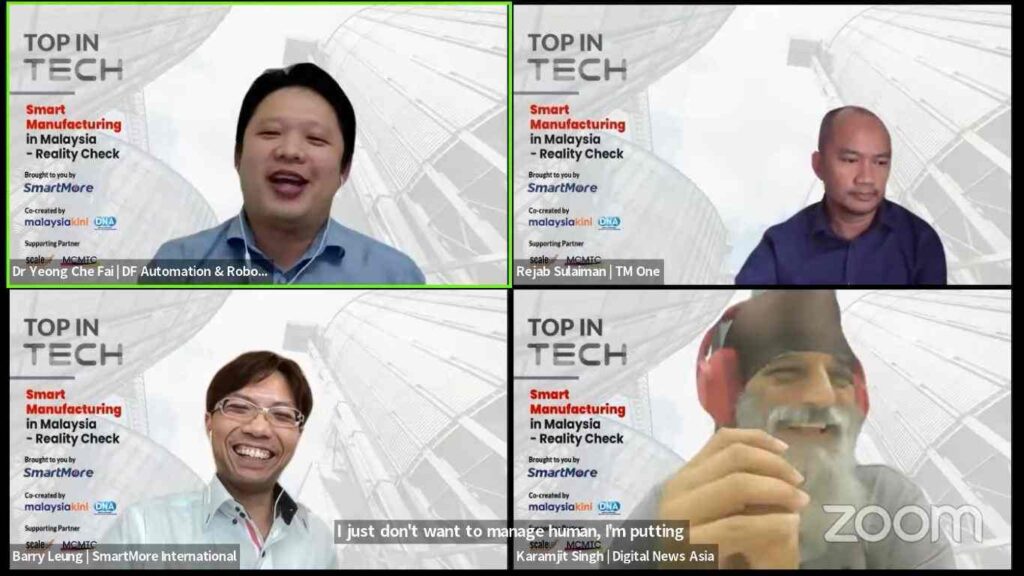
If we take an overview of what smart manufacturing means today - it is generally described as the application of artificial intelligence (AI) and automation in manufacturing, which is targeted toward evolving the ideal factory of the future.
This is usually defined by industry commenters as an intelligent factory utilising robotics, AI, and internet of things (IoT) technologies. Actual implementation focuses on installing sensors to collect data of products and equipment at each phase of the production process.
Meanwhile, robots should work autonomously and collaboratively to achieve often complex actions. Each processing station and production can work independently or in collaboration and self-adjust procedures in synch with the intended process.
Summarised in a Deloitte report1, connectivity and convergence are the underlying themes in Industry 4.0 as applied to manufacturing systems. Ideally, 'it is a leap forward from more traditional automation to a fully connected and flexible system,' the key features of such a manufacturing system can be summarised as: responsive, adaptive, and connected.
An April 2022 release by market research firm Vantage of Smart Manufacturing Market Growth and Trends2 report expects the smart manufacturing market to reach a valuation of US$237.4 billion by 2028, driven largely by demand in the retail sector, however.
Interestingly, Asia Pacific has been singled out by the report as the fastest regional to adopt smart manufacturing. Examples include India's 'Make in India' initiative, which has zeroed in on automating in-house manufacturing facilities.
In Malaysia, the country's digital economy focus, which includes developing smart communities among many other components, is anchored to the same transformational trajectory as the rest of the world
As smart manufacturing is another important component of the nation's thrust, a recent industry forum set out to3 probe the current state of smart manufacturing in Malaysia.
Moderated by Karamjit Singh, CEO of Digital News Asia, the discussion featured industry speakers: Rejab Sulaiman, Vice President, Products & Innovation of TM One; Barry Leung, General Manager of SmartMore; and Prof Dr Yeong Che Fai, Chairman of DF Automation & Robotics.

As part of the introductory round, the panellists were asked for their opinion on where Malaysia was today as a nation on the road to Industry 4.0 maturation. On a rough scale of 0-5, the consensus was deemed to be average - 2.5. This could be related to 98% of businesses in the country being small and medium enterprises (SMEs), which could barely rate 1+, while those larger companies, already on the transformational road, were pushing 4+.
Both SmartMore's Leung Prof Dr Yeong opined that resistance to adoption could be attributed to many factors: low minimum wage rates in the country preclude the need to adopt digital (such as robotics) on a large scale; no pressure on profit margins, and also low awareness of digitalisation, especially among smaller companies.
On the positive front however, all three speakers pointed to more digital projects and a steady increase in awareness of the benefits of digitalisation in the sector.
Rejab also pointed out that due to the pandemic, manufacturing companies today said their top three (3) priorities are to build resilience for their business and operating models; to enhance operational excellence; and to automate routine human tasks.
Although digital adoption is still low; the sector is starting to actively explore these solutions.
Some of the insights from the panel were recently confirmed by reports from various analysts and commenters.
SmartMore's Leung pointed out that the technologies underlying smart manufacturing were pretty mature.
Many commenters generally agree on the key trends arising from these technologies in manufacturing. For example, a Forbes commentary cited4 together StarUs Insights5, a platform scouting startups, has put pointed to some current contributors to Industry 4.0, a few or which are quickly noted here:
These all underpin the importance of manufacturing as the core building engine of our society.
In his introductory remarks, Rejab stressed that, "Today's TM One is not just about offering digital connectivity, it's not just about fibre, it is also about wireless - both 4G and 5G: we are building the digital infrastructure foundation that we can offer all of our enterprise and government customers. These sectors range across healthcare, banking, energy, education, and others."
TM One has built a strong foundation to help industries revolutionise and reshape businesses and cities, he said, when outlining an array of technologies, expertise and relevant skills readily available to drive transformation in Malaysia's manufacturing sector from TM One.
"Digital transformation (DX) is a process of moving to a technology-enabled platform to positively change a business model while providing new revenue streams and after-sales opportunities."
With smart manufacturing, the end objective of any initiative is to bring in automation by digitalising very aspect of the touchpoints from digital supply chains, connected and highly informed customers: convergence or linking of the business imperatives with operational data.
The journey comprises connecting machines to systems, monitoring and tracking, analysing the data, applying intelligent devices towards semi-automation - which is all part of a process towards full automation of production and the digitalisation of the ecosystem: one which is aiming for 100% work efficiency.
Rejab pointed out that advanced manufacturing capabilities in Malaysia will find fresh impetus with the roll out of 5G's speed, low latency and other advantages. "Initial 5G rollouts will start with KL, Cyberjaya, Penang and so on. In terms of smart manufacturing, is expected to experience immediate impact for larger manufacturers in the beginning, especially with the use of the massive number of sensors [as in massive machine-type communications or mMTC]; time critical responses, which needs 5G specs, [as in ultra-reliable low latency communications or uRLLC]; and high capacity services [as in enhanced mobile broadband or eMBB]."
As manufacturers in some sectors are already using IoT and 5G enhanced connectivity to build more agile production - such as with automated guided vehicles (AGVs), and autonomous mobile robots (AMRs) - understanding what a smart factory is important, said Prof Dr Yeong.
UK based independent research and technology organisation, TWI Ltd (formerly the British Welding Research Association7), defines a smart factory as 'a digitised manufacturing facility that uses connected devices, machinery and production systems to continuously collect and share data. This data is then used to inform decisions to improve processes as well as address any issues that may arise.'
Since the technologies used include AI, big data analytics cloud computing and IIoT, more technical skills are needed and today's manufacturing workers need to be hired for their brains as well, traditionally - their hands.
These skills span coding to handling AI pored robots, which can all be learned by employees and students ready to develop these competences.
Initiatives from government are of course welcome to promote the skill sets needed for smart manufacturing, said Prof Dr Yeong. "From the university perspective, we can help prepare our students, encouraging them to work on projects in smart manufacturing; government encouraging projects - universities face the challenge of providing a foundation as the scope demanded by industry is too vast."
Around the world, commenters have8 noted increasing government support for smart computing, which includes investing in IoT and industrial 3D printing research and development for IoT.
Malaysia too is rolling out initiatives such as the country’s Industry4WRD policy9.
Furthermore, although low adoption has been linked to smaller concerns, Rejab in response to a question about using smart manufacturing solutions in kampung or rural based businesses (sometimes called cottage industries in some western parts ) pointed out that: "Smart manufacturing is not just about robotics; it is about putting together solutions that are appropriate to your factory. Businesses can install IoT sensors into your plant operations, and collect insights for dashboard reporting. There are many uses for these solutions because the core lies in the use of sensors throughout your chain and the use of data from it."
The encroaching reality is that more and more companies are facing the problems of costs, and will realise it is time to adopt smart solutions, said Prof Dr Yeong, adding that adoption levels are also aligned to raising the level of awareness, and further government encouragement will help accelerate digital adoption.
Echoing two themes noted by industry watchers, the panel agreed that trust and confidence will be needed to build awareness and dispel much of the uncertainties arising from the pandemic era
Another is to refresh scenario planning to offset future disruptions in the industry, a process explored by TM One during one of its leadership events, LEAP 202010.
Coupled with selecting the right solutions, building deeper partnerships between manufacturers and customers are important parts of transformation, affirmed TM One's Rejab, who later added: "The next few years will indeed the most important ones for Malaysia's manufacturing, warehousing and associated industries to build for sustainable growth and generate value in the digital arena."
This article first appeared in Disruptive News Asia11
1 The Smart Factory - Deloitte Report —
https://www2.deloitte.com/content/dam/insights/us/articles/4051_The-smart-factory/DUP_The-smart-factory.pdf
2 Global Smart Manufacturing Market | Vantage Market Research — https://www.vantagemarketresearch.com/press-release/smart-manufacturing-market-149600
3 Top In Tech Series - EP23: Smart Manufacturing in Malaysia - Reality Check - YouTube — https://www.youtube.com/watch?v=HhYWOgKD-BA
4 The 10 Biggest Future Trends In Manufacturing — https://www.forbes.com/sites/bernardmarr/2022/01/25/the-10-biggest-future-trends-in-manufacturing/?sh=4eb91ffd4d56
5 Top 10 Manufacturing Trends & Innovations for 2022 | StartUs Insights — https://www.startus-insights.com/innovators-guide/manufacturing-trends-innovation/
6 7 Amazing Examples of Digital Twin Technology In Practice | Bernard Marr — https://bernardmarr.com/7-amazing-examples-of-digital-twin-technology-in-practice/
7 What is a Smart Factory? (A Complete Guide) - TWI — https://www.twi-global.com/technical-knowledge/faqs/what-is-a-smart-factory
8 Top 10 Smart Manufacturing Trends for 2022 | ATS — https://www.advancedtech.com/blog/smart-manufacturing-trends/
9 Industry4WRD Readiness Assessment | Official Website of Malaysia Productivity Corporation — https://www.mpc.gov.my/industry4wrd/
10 Jumpstarting Malaysia's digital economy with scenario planning — https://disruptive.asia/jumpstarting-malaysias-digital-economy-with-scenario-planning/
11 Making Smart Manufacturing Real in Malaysia - https://disruptive.asia/making-smart-manufacturing-real-in-malaysia/